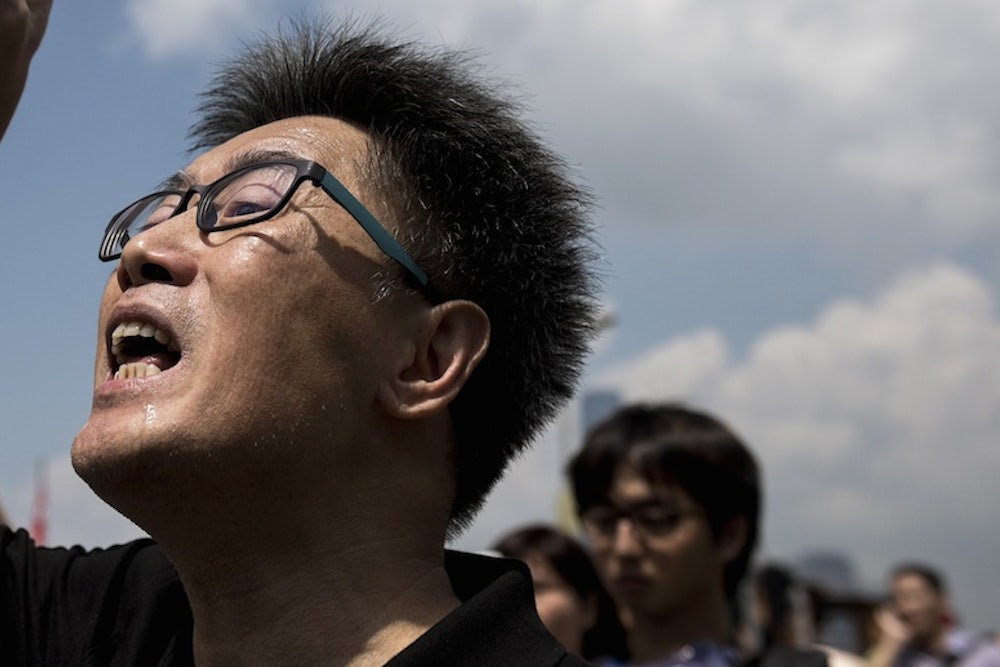On Tuesday night at 11 p.m., Sony Singh was protesting in the Mong Kok neighborhood of Hong Kong when he heard an announcement over a bullhorn: They were opening a new node in the Occupy Central demonstrations, this time at the shopping district of Tsim Sha Tsui. The purpose, he said, was to spread their pro-democracy message to international shoppers who might not otherwise know about the movement. “So twenty people came here,” he said, his face lit by a building-tall LCD screen flashing a Burberry ad. Their numbers soon grew to several hundred.
But the decision to occupy Tsim Sha Shui was motivated by more than just a desire for international publicity. The neighborhood is famous for the high volume of tourists from mainland China, and has become a focus for Hong Kong’s anti-mainland movement, led by groups such as Civic Passion and the Proletariat Political Institute. Since the handover from Britain in 1997, nativist sentiment in Hong Kong has grown, fueled by a flood of mainland tourists coming to Hong Kong to purchase luxury goods with no sales tax, buy up property, and in some cases deliver babies. (Mainland tourists account for 75 percent of visitors to Hong Kong.) In 2012, Hong Kongers marched through Tsim Sha Tsui denouncing mainlanders as “locusts” eating up the city’s resources. In recent years on June 4, the anniversary of the Tiananmen Square massacre, anti-mainlanders have staged a rally in the shopping district for those who think the main candlelight vigil at Victoria Park is too timid. “You could call it a racist movement,” said Cheung Wing Hang, 27, a student in cultural studies at Ling Nan University, who added that a number of the protesters there on Wednesday were “extreme localists.”
Occupy Central organizers have done their best to distance themselves from the anti-mainland movement and keep the focus on election reform and universal suffrage. Addressing the crowd in Tsim Sha Tsui, Caleb Lam, 27, tried to keep things positive. “All you tourists, Hong Kong welcomes you,” he said into the microphone. “I’m glad you’re here to witness this.” Offstage, he told me that many protesters have been taking the mic to rail against mainlanders. “It happens all the time,” he said. “We try to get them offstage.”
But pro-democracy ideas and anti-mainland sentiment can be difficult to tease apart in Hong Kong. Many protesters want autonomy for Hong Kong in order to boost policies that will mitigate the influence of mainland Chinese on the island. For example, they support liming the number of properties that mainlanders can buy in Hong Kong and tightening visa regulations. (Ironically, the much-denounced chief executive C.Y. Leung has promoted some of these policies.) Of course, defensive policy positions easily blur with personal feelings toward mainland Chinese.
Even Lam, the polite public speaker, was having trouble containing his feelings about mainlanders. “To put it bluntly, tourists would take a dump in public,” he told me. “They jump in front of everybody in line. We can’t take it anymore. We’ve tried the whole ‘We’re all Chinese people’ thing. It’s not working.” Other protesters I spoke with voiced similar frustrations. “They break the law,” said Ronald Fung, a high school math teacher. “They eat on the MTR [the subway], they urinate in the street.” Police won’t enforce the law, he said, for fear of creating conflict with the mainland. Leona Ho, 25, mourned the transition of the neighborhood from small businesses to jewelry and handbag stores targeting wealthy tourists. “Canton Road is a famous street in Hong Kong, but it’s not for Hong Kong people anymore,” she said. “If you come here on a holiday, you never hear Cantonese, everyone’s speaking Mandarin.”
One student from the University of Hong Kong, Louis Lee, 23, was conducting a survey of the businesses in the neighborhood. He’d already counted five watch shops, nine gold and jewelry stores, and eight pharmacies. (Many mainland Chinese come to Hong Kong to buy baby formula, since they don’t trust the infant milk powder back home.) “There’s an imbalance in the business ecology,” he said, standing in front of a Gucci store. “I would never buy gold.” As we spoke, a middle-aged Hong Kong woman in an Armani shirt who had been arguing loudly with a crowd of protestors came over. She said that tourism was an important part of Hong Kong’s economy: “Mainlanders give us a lot of business.” Lee responded that tourists would rather see more traditional Hong Kong neighborhoods than big box stores.
Needless to say, mainland shoppers passing through Tsim Sha Tsui didn’t feel especially welcome. “It’s not safe here,” said Zhen, a 25-year-old woman from Wuxi who had come to Hong Kong for the national holiday. “If I’d known about this before, I would have canceled my trip.” (In fact, Beijing suspended tour groups to Hong Kong this week.) She added that protests like this would never happen back home. “Everybody there wants peace,” she said. “We just pay attention to our own affairs.” A young woman named Liu, who also declined to give her full name, said Hong Kongers should be grateful that mainlanders are supporting their economy. “I don’t think they should complain,” she said. “During the more than hundred years of British occupation, they didn’t do this.” Most of the mainlanders I approached didn’t want to talk at all. “It’s just a small conflict,” one woman said without stopping. “It’ll be resolved soon.”
